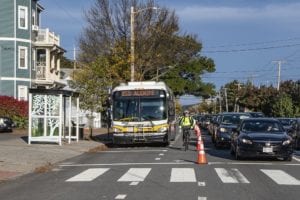Who is a member?
Our members are the local governments of Massachusetts and their elected and appointed leadership.

The MBTA 350 bus to the Alewife Station makes it way down a bus-only lane that Arlington piloted for a month this fall.
As Arlington seeks ways to improve traffic flow during the morning commute, the town recently completed a month-long trial of a bus-only lane on its main thoroughfare, Massachusetts Avenue.
From from 6 to 9 a.m. on each weekday from Oct. 9 through Nov. 9, the town turned the parking lane along the four-lane street into a dedicated eastbound bus lane, ending at the Alewife Brook Parkway intersection on the Arlington-Cambridge line – a corridor used by three MBTA bus routes. Bicycles were also allowed to use the dedicated lane, which ran approximately one-third of a mile.
Preliminary results from the MBTA showed that the average commute from Arlington center to Porter Square in Cambridge – two stops down from Alewife – was six minutes shorter during the pilot, according to Town Manager Adam Chapdelaine.
“For transit, that’s a pretty tremendous time saver,” he said.
Chapdelaine said the impetus for the pilot came from a Massachusetts Department of Transportation grant the town used to study the most efficient way to get commuters to Alewife, which is a short trip from the Massachusetts Avenue intersection down Alewife Brook Parkway.
The studies suggested improving bus service, which led the town to apply for and receive a $100,000 grant in late 2017 from the nonprofit Barr Foundation to test bus rapid transit as a way of reducing greenhouse gas emissions. The city of Everett and a partnership between Watertown and Cambridge also received grants.
In addition to MassDOT and the MBTA, Arlington needed to coordinate with Cambridge, which controls the traffic lights at the intersection of Massachusetts Avenue and Alewife Brook Parkway, and the Department of Conservation and Recreation, which owns the parkway, in order to implement the bus-only lane.
“It was really a multi-jurisdictional coordination,” Chapdelaine said.
Two major community concerns before implementation of the pilot were the loss of parking spaces in the morning and drivers seeking to cut through side streets off Massachusetts Avenue.
“The major thing we said is that the pilot was intended t0 study those impacts, whether the parking impacts are real and businesses are affected, and then make an assessment after implementation of the lane,” Chapdelaine said.
The town ran a post-pilot survey of residents and commuters through November, and will review that feedback and the full set of MBTA data through the end of the year. The goal is to deliver a report in early 2018 on recommendations for a permanent bus lane and other transit improvements along the Massachusetts Avenue corridor.